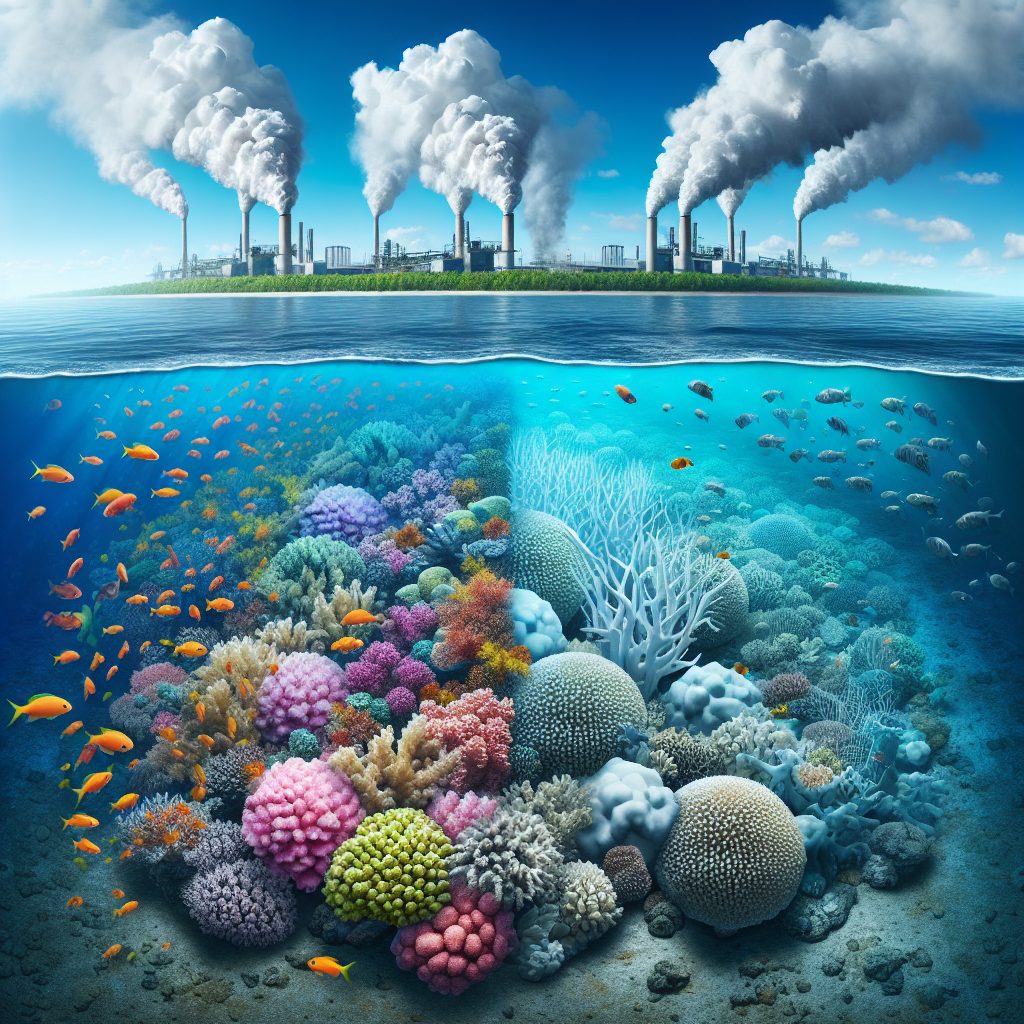
Ocean acidification is the process by which the level of acidity in the world’s oceans increases due to the absorption of carbon dioxide from the atmosphere. It takes place at an unprecedented rate that is causing considerable damage to marine ecosystems. The changes in the chemical composition of the oceans can cause tissue and skeleton damage in both coral reefs and shellfish, leading to reduced populations and subsequent habitat destruction. Marine life is also directly affected as changes in ocean chemistry impact vital species such as phytoplankton, which are essential for carbon sequestration and marine food webs. Additionally, ocean acidification makes the water more corrosive, making it harder for shellfish to grow.
Not only does ocean acidification threaten the ocean itself, but it also has serious implications for humans. Changes in ocean chemistry can impact fishing industries, disrupt recreational activities, and cause economic losses. This can lead to financial and environmental hardship as well as food security challenges, further impacting coastal communities and their livelihoods. In addition, the damage to coral reefs can have far-reaching effects; as nurseries for fish, coral reefs provide food to hundreds of millions of people worldwide, and a decrease in their populations can have ripple effects throughout the global food chain. In the coming paragraphs, we will discuss the key considerations for ocean acidification, and the necessary steps that need to be taken to mitigate its impacts.
Key Takeaways
1. Ocean acidification is caused by increased carbon dioxide (CO2) in the atmosphere, which dissolves in the surface of the sea and decreases pH levels in the ocean.
2. Studies show that ocean acidification has a wide range of impacts on marine organisms, including disruption of the growth and survival of coral reefs, damage to shellfish, and changes in the distribution of species.
3. Ocean acidification can also affect the overall productivity and health of marine ecosystems and resources crucial to human livelihoods.
4. While technological solutions can mitigate the impacts of ocean acidification, the most effective way to reduce its effects is to reduce emissions of CO2 into the atmosphere.
5. To date, efforts to reduce emissions of CO2 to meet international targets have been largely unsuccessful. Thus, to avoid serious consequences, more effective strategies must be developed to reduce emissions.
What is Ocean Acidification?
Ocean acidification is a process whereby the ocean’s alkaline properties are reduced due to an absorption of increased amounts of carbon dioxide from the atmosphere. This is caused by the rise of greenhouse gas emissions, mostly from human activities such as burning fossil fuels, which results in an increase in carbon dioxide levels in the atmosphere. This carbon dioxide is absorbed by the ocean, resulting in a cascade of chemical reactions that reduces the pH of the ocean, making it more acidic.
How Does Ocean Acidification Affect Marine Life?
Ocean acidification affects marine life in a variety of ways. As the pH of the ocean becomes more acidic, many organisms struggle to create their protective shells and skeletons, as well as their ability to survive. This affects the entire food chain, as organisms that rely on these other organisms may be unable to thrive due to a decrease in their food sources. Additionally, rapid changes in pH levels can disrupt the delicate balance of important biochemical processes, such as photosynthesis and respiration, and can harm organisms that rely on specific pH levels or conditions.
What Causes Ocean Acidification?
The primary cause of ocean acidification is the release of greenhouse gases from human activities, primarily the burning of fossil fuels. The increase of carbon dioxide levels in the atmosphere is absorbed by the ocean, resulting in a reduction of its alkalinity levels. This process is called ocean acidification. It has been estimated that over 30 percent of the total amount of carbon dioxide released into the atmosphere by human activities is absorbed into the ocean.
What Are the Effects of Ocean Acidification?
Ocean acidification affects organisms in the ocean in multiple ways. For example, shell-forming organisms such as corals, oysters, and mussels can have difficulty building and maintaining their protective shells due to the reduction of alkaline properties in the ocean. Additionally, their ability to detect predators or food sources can be negatively affected by changes in pH levels. Organisms such as phytoplankton and zooplankton have also been shown to become less abundant in areas of higher acidification.
What Steps Can We Take to Reduce Ocean Acidification?
1. Reduce greenhouse gas emissions: The most direct way to reduce ocean acidification is to reduce greenhouse gas emissions, primarily from burning fossil fuels. This is both an environmental and an economic issue that requires efforts from individuals, corporations, and governments.
2. Plant trees: Growing trees helps to capture carbon dioxide from the atmosphere before it reaches the ocean. This in turn reduces acidification.
3. Improve water & land management practices: The quality and quantity of water runoff to the ocean has a direct effect on the alkalinity values of the ocean. Reducing soil erosion, pollution, and impermeable surfaces can help to reduce the alkalinity levels of algae blooms and other ocean pollutants.
4. Support ocean conservation efforts: There are many organizations that are dedicated to preserving and sustaining ocean health. Supporting these organizations financially is a great way to help reduce ocean acidification.
5. Implement regulations and limit pollutants: Plastics, fertilizers, and other pollutants pose a major threat to marine ecosystems. Implementing regulations that limit the amount of pollutants released into the ocean can have a positive effect.
What Are Some Tips for Living More Sustainably and Preventing Ocean Acidification?
1. Eat sustainable seafood: Eating seafood that is caught sustainably helps to reduce the impact of overfishing. Additionally, sustainably caught seafood helps to promote a healthy ocean by allowing fish populations to remain healthy and able to reproduce.
2. Reduce your consumption of single-use plastics: Avoiding disposable plastic is a great way to reduce ocean pollution. Switching to reusable containers and utensils can greatly reduce the amount of plastic that ends up in the ocean.
3. Support ocean cleanups: Participating in ocean cleanups is a great way to help reduce the amount of plastic and debris in the ocean. Many organizations organize regular cleanups, which can help to reduce ocean acidification.
4. Use green energy sources: Using renewable energy, such as solar and wind power, instead of fossil fuels can help to reduce greenhouse gas emissions and therefore reduce ocean acidification.
5. Support responsible companies: Choosing to buy products from companies that take steps to reduce their impact on the environment can help to support sustainability and prevent ocean acidification.
What is Ocean Acidification?
Ocean acidification is the process by which the ocean absorbs large amounts of carbon dioxide from the atmosphere. This causes a decrease in the pH of the ocean, leading to more acidic waters. When this happens, it affects the overall chemistry of the ocean, changing the water chemistry and creating conditions that can make it harder for some marine species to survive.
What effects does Ocean Acidification have on aquatic ecosystems?
Ocean acidification can cause a variety of negative effects to aquatic ecosystems. Many species of plants and animals have difficulty withstanding changes in pH levels. There are also changes in the availability of minerals and other essential nutrients that can drastically affect the balance of energy between predators and prey. In addition, the acidification of oceans causes decreased oxygen levels which can further reduce the diversity of species that are able to live in the affected areas and lead to further degradation of the ecosystems.
What are the potential consequences of Ocean Acidification?
The potential consequences of ocean acidification are numerous. It is believed that it can lead to mass extinction of certain species, due to their inability to cope with the changing pH levels. Moreover, the acidification of the oceans can disrupt food chains, leading to further population declines of certain species and even the possible extinction of entire marine communities. In addition, it can lead to a decrease in the production of important vitamins and minerals essential for human health, and could result in health issues.
How can humans help to reduce Ocean Acidification?
There are a few different ways humans can work to reduce their impact on ocean acidification. The most effective way is to reduce the amount of carbon dioxide in the atmosphere by limiting their own emissions. This can be done through the use of renewable energy sources or efficient energy consumption practices. Additionally, humans can help to reduce oceanic acidification by helping to preserve and protect vulnerable habitats like coral reefs, which when left intact can absorb more of the greenhouse gasses and help to reduce the amount of acid in the ocean.
What countries have the most issue with Ocean Acidification?
Ocean acidification affects all oceans equally; however, some countries are more susceptible to the impact of changing ocean pH than others. Places like the Caribbean, parts of the Mediterranean, and many island nations that depend on marine life for their livelihood face an increased amount of acidification. Additionally, countries that rely heavily on fishing, such as Japan and the United States, are increasingly being affected by the phenomenon.
Are there any successful initiatives being organized to help reduce instances of Ocean Acidification?
Yes, a variety of initiatives have been organized to help combat ocean acidification. In many places, there are efforts being made to reduce emissions into the atmosphere, which helps keep carbon dioxide out of the ocean. Additionally, various organizations are working to preserve habitats and restore ecosystems that have been negatively impacted by acidification. Finally, various countries have signed international agreements to work together to reduce the damage from climate change, which has an indirect effect on ocean acidification.
Can I make a personal contribution to help address Ocean Acidification?
Yes, there are a variety of ways that individuals can make contributions towards addressing ocean acidification. For example, individuals can reduce their own carbon emissions by relying more heavily on renewable energy sources, using more energy-efficient appliances, and shopping for sustainably-sourced food products. Additionally, individuals can support organizations that work to protect vulnerable habitats and ecosystems, as well as research and educational institutions focused on further understanding acidification.
Is Ocean Acidification a recent problem?
No, ocean acidification is not a recent problem. In fact, it has been occurring since the beginning of the industrial revolution in the 18th century. However, in the past few decades, the process has been exacerbated by increasing levels of carbon dioxide in the atmosphere, caused largely by human activities. These activities have lead to a much faster and more extreme acidification of the ocean.
What is the current status of Ocean Acidification?
Currently, ocean acidification is still occurring and is having a wide variety of impacts on marine species, ecosystems, and humans. Many species are struggling to adapt to the changing conditions of the ocean and some areas have already seen significant instances of species extinction or significant population declines. Additionally, ocean acidification has been linked to the degradation of coral reefs, which play an important role in maintaining healthy marine and coastal ecosystems.
Final Thoughts
Ocean acidification presents a significant threat to our oceans and the many species, ecosystems, and humans that depend on them. It is important that humans work together to reduce the amount of carbon dioxide being released into the atmosphere, in order to slow down and eventually halt the process of ocean acidification. Additionally, individuals can contribute by supporting organizations that work to protect vulnerable habitats, restore degraded ecosystems, and further expand our understanding of the process of acidification.
Ocean acidification is a global problem, and solving it will require a global effort. It is up to us to reduce our emissions and protect our oceans and coasts. We can make an impact and help ensure the health and vitality of this vital resource for generations to come.



